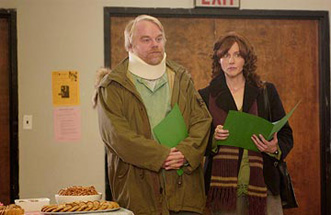|
|
Movie Review: The SavagesBy Matthew HuntleyJanuary 10, 2008
Jon, who doesn't seem to care for his father much for reasons we learn later on, finds "a place that will take him" in Buffalo, but Wendy continues to look for something better and more expensive. Without ever admitting it, Wendy feels guilty for sticking her father in a strange environment and making him someone else's problem. Jon says to her bluntly that nursing homes, with their beautiful landscaping, flowers, and clean living, only delay people from accepting the truth: that life eventually boils down to "sh*t, p*ss and stink!" Several scenes go into lugubrious detail about what it takes to care for the elderly, including one on an airplane when Wendy flies with her father back East. We see how something so simple becomes a major production. Larry first needs a wheelchair, and then two members of the airport staff must strap him into another chair and wheel him to his seat. Larry then screams for the bathroom, all while Wendy receives dirty looks and stares from the other passengers. Eventually, this leads to one of the film's most heartbreaking shots that had me dreading ever being in Wendy's position yet giving her my complete sympathy. Wendy and Jon's ordeal with their father is the film's central conflict, but it's also a staging ground for a deeper examination of their characters. These are two siblings who have drifted apart and who must learn to love each other as sister and brother again. It's difficult because of the mistrust and disdain for each other. Jon doesn't think Wendy is doing much with her life and is stunned (and incredulous) when she tells him she received a grant from the Guggenheim. At the same time, Wendy finds Jon's lifestyle too meaningless and self-indulgent. But the two also share some of the same problems. Neither, for instance, can maintain a healthy relationship with other people. Wendy sleeps with a married man (Peter Friedman) more than ten years older than her and Jon has commitment issues with his Polish girlfriend (Cara Seymour). Their inability to admit to their own mistakes manifests in arguments and a brilliant scene shows Larry attempting to ignore their bickering through the cleverest means. Above all else, The Savages is simply sad. What it shows is the inevitable and depressing truth that people eventually grow old and sometimes apart. Yes, we keep visiting our friends and family members in nursing homes (and other places) because we love them, but we must also admit it's because we feel obligated. The film doesn't simply capture this fact of life; it shows it in a completely unaffected way. It's also true emotion, and never falsely presented. Jenkins' dialogue is authentic, natural and witty. It doesn't just see its situations as emotional dilemmas regarding death, but as moments of real human insight. A special scene takes place in a van between Wendy and her father's Nigerian caretaker. The two simply talk, smoke and pet a cat. Their conversation is about living, ideals and corny things like love. It's the first real conversation Wendy has had in a long time. Once again, Laura Linney reminds us of her tremendous range. It's amazing how in one year she's able to cross over seamlessly from the Hollywood mainstream (Breach) to quieter, less publicized films like this one. I was also amazed that Seymour Hoffman, after his Oscar win, graciously took a step back and allowed this to be Wendy's story. And as their decrepit father, Bosco opens himself up to great vulnerability, playing a pathetic man who realizes his time is up. All the people, situations and events in The Savages are grounded in stark realism and generate a grand, yet genuine, emotional impact. It's further proof the most powerful films are those with truth at their center. That truth isn't always easy to watch and accept, but it's what we respond to.
|

|
|
|

|
Thursday, October 31, 2024
© 2024 Box Office Prophets, a division of One Of Us, Inc.


